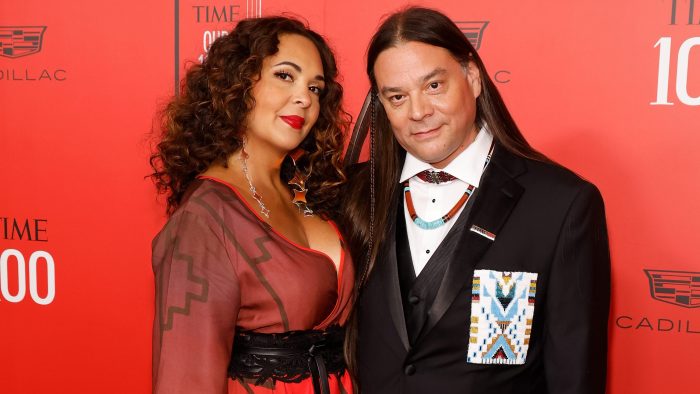After the opening of Minneapolis Native American restaurant Owamni, Sean Sherman, an Oglala Lakota chef, pivoted to a new level of visibility, winning the James Beard Award for Best New Restaurant in the United States for 2022. Owamni embraces the ideals of the Indigenous Food (Re)volution that Sherman has spread for years through his brand The Sioux Chef, but this time in a brick-and-mortar restaurant.
Almost a year after Owamni opened, I became intrigued by a different direction Sherman was taking with his romantic and business partner, Black Minneapolis food writer Mecca Bos — coalition building with different groups of people of color, focusing on the connection between Black and Indigenous food.
How Zachary ‘Big Zak’ Wallace made Local Green an oasis in an Atlanta food desertRead now
In 2022, Bos and Sherman started a new nonprofit organization called the BIPOC Foodways Alliance, highlighting multicultural histories of food traditions through dinners and community building to dismantle white supremacy. In May 2023, the duo led a tasting menu at Platform, the new James Beard Foundation chef-in-residence program, serving dishes such as jollof rice with mango and scotch bonnet pepper and smoked goat mushroom egusi with fufu and dried collards.
The idea of discussing the intersection between Black and Indigenous food is an intuitive one. One cannot mention the oppression of one group in this country and continent without mentioning the oppression of the other. That synchronicity follows with the food. The trade of African seeds between agricultural tribes, Sherman said, was facilitated by the Mississippi River, which flows north to south, from Minnesota to southern Louisiana. Owamni overlooks the Mississippi River, or the Haha Wakpa as it’s called by the Dakota, one of its many Indigenous names.
“There’s so much crossover with African and Indigenous histories, especially the United States, and especially in terms of agricultural knowledge,” Sherman said. “Not only did [the European colonists]take both people’s seeds but they commodified them and used slave labor and stolen land to make it possible.”
With more than 20 years of experience as a food journalist and chef in Minneapolis-area restaurants, Bos said that her goal for BIPOC Foodways, using food as a tool, is to increase solidarity between Black and Indigenous people. “I see so many commonalities in our oppression historically and to this day,” she said.
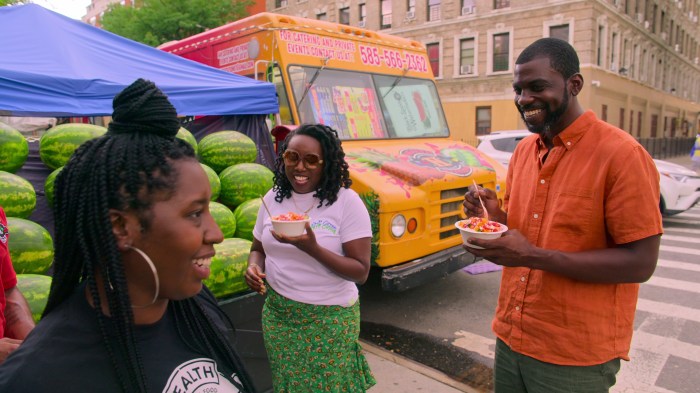 ‘High on the Hog’ host Stephen Satterfield dives into Black food’s revolutionary historyRead now
‘High on the Hog’ host Stephen Satterfield dives into Black food’s revolutionary historyRead now
During the first BIPOC Foodways Table Series I attended, I spent the night chatting with Somali chef Jamal Hashi, Trinidadian Chef Marla Jadoonanan, and other locals in the food industry. Each guest brought an element from their culture — Hashi brought a Somali fermented mango hot sauce — and it was all put into a huge paella pan of wild rice native to the Great Lakes region, manoomin in Ojibwe, that Sherman tended over an open fire. We drank and laughed until past midnight, alternating between humorous and sobering conversations, talks of revolution and art, and examinations of how the uprisings in the wake of the murder of George Floyd by Minneapolis police had changed the culinary community for people of color in Minneapolis.
From that first dinner, it felt like the BIPOC Foodways Table Series was part of the latest resurgence of the salon, which is increasing in food culture for people of color. Ananya Chopra and Kritika Manchanda’s chic monthly supper club The Salon connects New York artists to South Asian food, while Questlove’s Food Salon brings chefs and artists together to talk about culture and activism. An Enlightenment-era French term, the salon refers to a gathering of people to discuss art, politics, literature, or social issues. Salons played a critical role during the Harlem Renaissance, with artists such as writer Zora Neale Hurston frequently hosting dinner parties where intellectuals and artists gathered over drinks, food, and music.
Despite its purpose to bring people together, Bos said that the BIPOC Foodways Alliance has received some pushback. “There’s been a little friction about BIPOC Foodways Alliance as if it’s something in conflict with Sean’s existing work. And it’s not,” she said. Bos said the responses she gets are that each culture is trying to reclaim itself and that separate reclamation should happen before coalition building. “I disagree because I feel like both things can happen at once. I don’t see why it has to be either-or.”
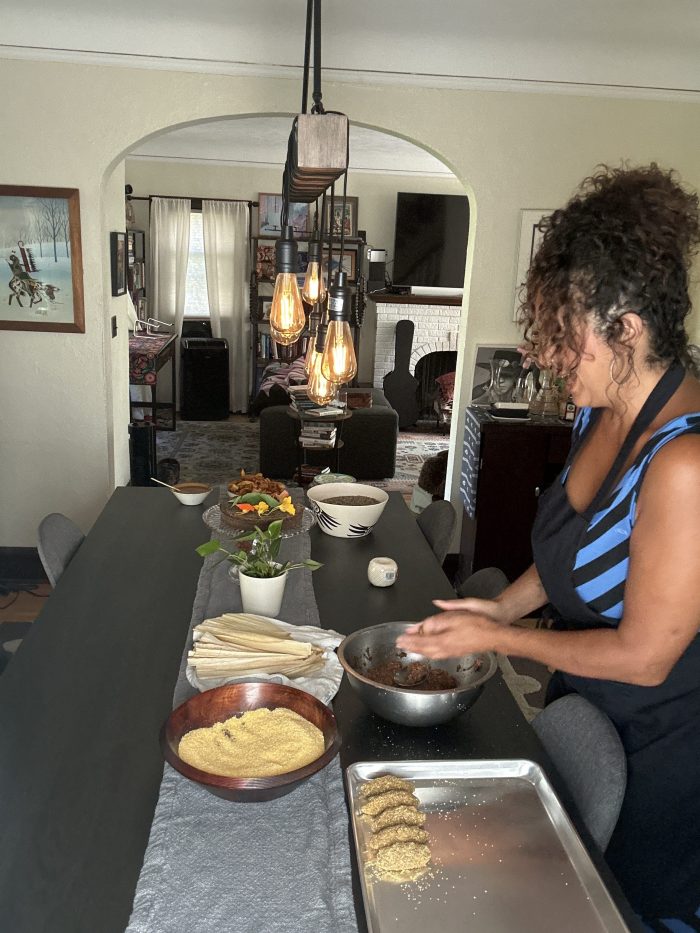 Minneapolis food writer Mecca Bos prepares items for the menu.
Minneapolis food writer Mecca Bos prepares items for the menu.
Nylah Burton
Still curious from my first BIPOC Foodways dinner, I went to Minneapolis this summer for my second one, an intimate affair hosted by Sherman and Bos and attended by Bos’ niece and BIPOC Foodways social media content director Sabrina Fluegel, Luke and Linda Black Elk, a married couple who are ethnobotanists and food sovereignty activists. After I left for their house from the Emery Hotel, Sherman and I gathered greens for the smoked turkey egusi from their garden outside, like wild arugula and chard. While Sherman or their guests will sometimes cook during the BIPOC Foodways dinner, highlighting their own traditions, Bos prepared every dish for this dinner.
Before dinner, Sherman and I gathered greens such as wild arugula and chard for the smoked turkey egusi from their garden outside. There was a steaming bowl of jollof in savory tomato sauce made with manoomin. Nestled in the wild rice jollof was tenderly cooked quail. Bos had also made two sides of intensely spicy homemade pepper sauce, reminiscent of Caribbean or West African varieties. And for dessert, she also served late chef Edna Lewis’ molasses cake with a perfect tamarind glaze, topped with edible flowers she also gathered from their garden.
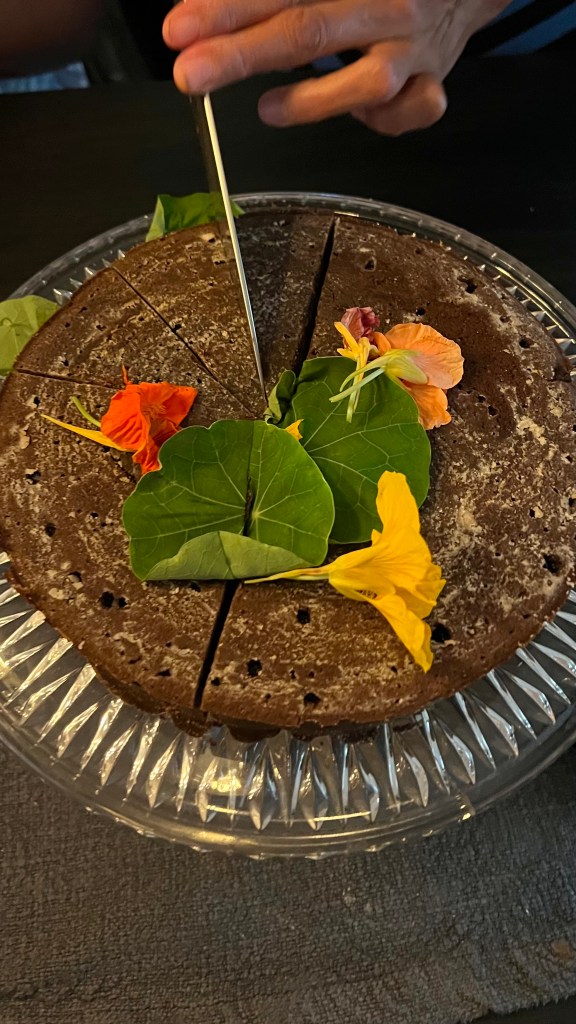 A molasses cake topped with edible flowers gathered from the garden.
A molasses cake topped with edible flowers gathered from the garden.
Sabrina Fluegel
Everything was delicious, but the stars of the night were the tamales. Made with elk — following Sherman’s technique, Bos did not use any pre-contact (locally cultivated and wild foods eaten by Indigenous people before European contact) ingredients such as poultry, beef, dairy, or sugar for this meal.
Before dinner, I helped Bos roll the tamales as she spoke about their connection to Black food in the South, a nod to the exchange between Mexican and Black people facilitated by the cotton that sharecroppers and exploited migrant workers, many of whom were Indigenous or descendants of Indigenous people, would harvest together.
“The Tamale Trail goes all throughout the Delta,” Bos said. “Throughout Mississippi and Louisiana, there’s a strong tradition of Black people doing tamales this way.”
In the South, Bos said, Black people often squeeze out the tamale filling and put it on a saltine cracker. But she used plantain chips instead to decolonize the menu by not using flour. Going over the menu for the night and recalling her and Sherman’s previous work at the Platform by James Beard Foundation dinner, Bos’ menus seemed not to have many Black Southern influences and more West African ones. I asked her if she considered herself a product of the Great Migration of African Americans from the South to the North.
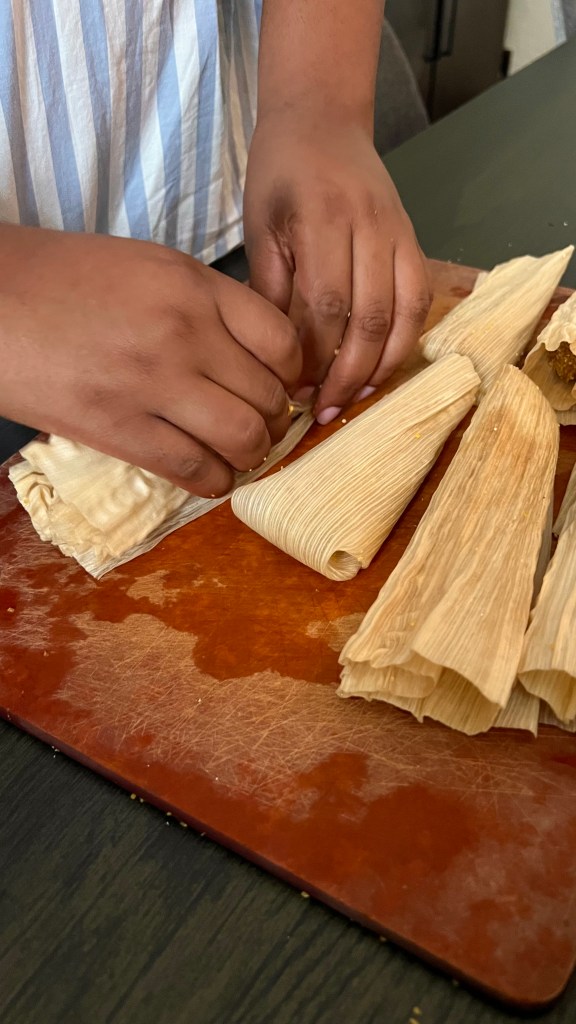 The author rolled hot tamales by hand as part of the night’s meal.
The author rolled hot tamales by hand as part of the night’s meal.
Sabrina Fluegel
“My father, who is the Black person in my bloodline, is adopted,” she explained, saying that her mother’s family was white Norwegian American, and they raised her. “So I don’t have any facts about why his family wound up here. I have to imagine that the Great Migration has something to do with why his folks were here, though. My father and I were estranged, which was the right thing. But it means I have had and probably will forever have to work to the food identity that resonates with me.”
But for Bos, what resonated with her most is explicitly West African food like jollof, fufu, and egusi. For most of her life, she felt disconnected from Black Southern food, believing the anti-Black propaganda that many Black people, especially those disconnected from the South, grew up hearing. “As someone who mostly engaged with this food via media, not home kitchens with the experts at the helm, the brainwashing was real and complete,” Bos wrote in a post on the BIPOC Foodways website. After Uche Iroegbu, a Nigerian home cook, collaborated with her on a BIPOC Foodway Table Series, Bos wrote that her food identity began to take a new shape. “ It was here that I had my epiphany of sorts — a glance at what my people’s cooking could have been had we been left to our own wisdom, ability, awareness.”
 San Francisco 49ers Trent Williams’ partnership with Black-led footwear brand pays off with trip to Super Bowl LVIIIRead now
San Francisco 49ers Trent Williams’ partnership with Black-led footwear brand pays off with trip to Super Bowl LVIIIRead now
When we discussed her love of West African food at dinner, she said, “I like the idea of engaging with what my indigeneity would have been.
“African-American food is amazing. I don’t go with the ‘We made something out of nothing’ storyline because that’s bulls—. African Americans were growing food, fishing, hunting and foraging. They were making delicacies. But we’ve been so cut off from the [African] continent. I know so little about it. So I’m grateful any time I get a chance to exercise those culinary muscles.”
I also asked Bos what she thought about eliminating pre-contact ingredients from this Black and Indigenous fusion style of cooking when African-American food is, almost by definition, a combination of the blended Indigenous, African, and European culinary traditions.
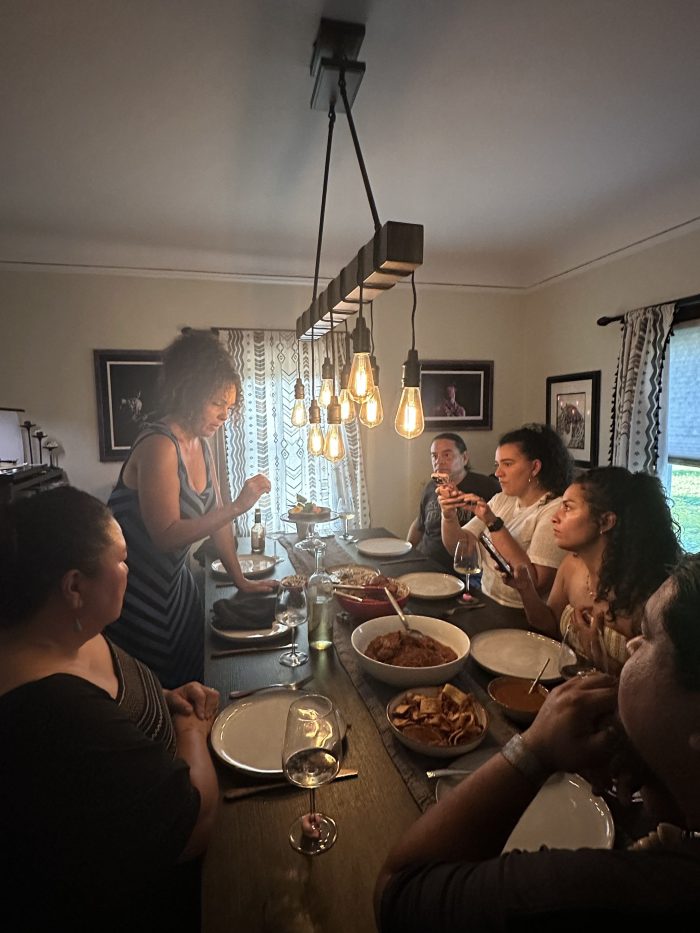 Clockwise from left to right: Minneapolis food writer Mecca Bos (standing), chef Sean Sherman, BIPOC Foodways social media content director Sabrina Fluegel, an unidentified guest, and ethnobotanists Luke Black Elk and Linda Black Elk.
Clockwise from left to right: Minneapolis food writer Mecca Bos (standing), chef Sean Sherman, BIPOC Foodways social media content director Sabrina Fluegel, an unidentified guest, and ethnobotanists Luke Black Elk and Linda Black Elk.
Nylah Burton
“I want to be careful about sounding like an expert, but one of the things Sean and I talk about a lot is how this is a revolution and an evolution,” Bos explained while graciously rerolling my loose tamales. “But there is this real urge, no matter who you are, to reclaim and understand history. I think we need to understand history, but I don’t think we have to be slaves to history. We can look forward.”
Can food end white supremacy? Not food itself, but the connections we make through learning about it, the ways we reach across the table to all colonized people and share thoughts and ideas, laughter and sobs, and endless stories. This can change the world and bring the importance of decolonization to the forefront. A project like the BIPOC Foodways Table Series, which presents these cultures as not divergent but existing inextricably from each other, could go a long way toward normalizing Black Native food and building those coalitions that will help dismantle white supremacy.
Nylah Burton is a travel, lifestyle, and entertainment writer with bylines in New York Magazine, Vogue, and Travel + Leisure.
